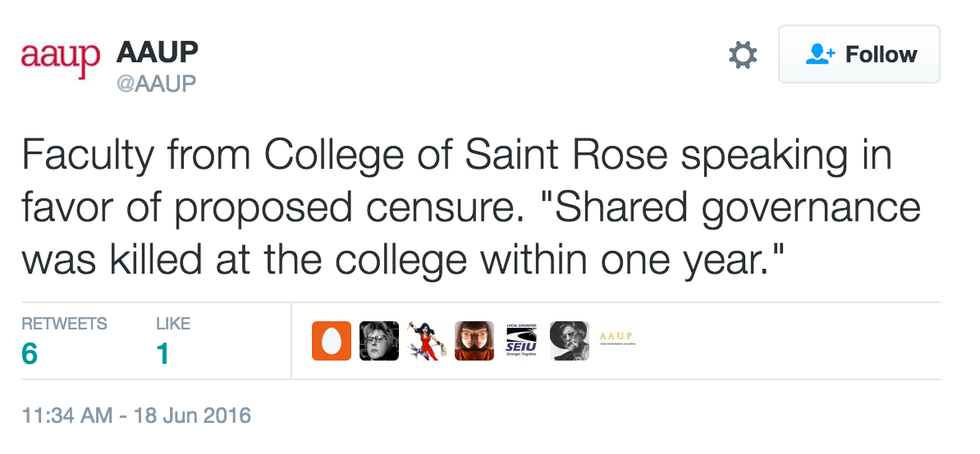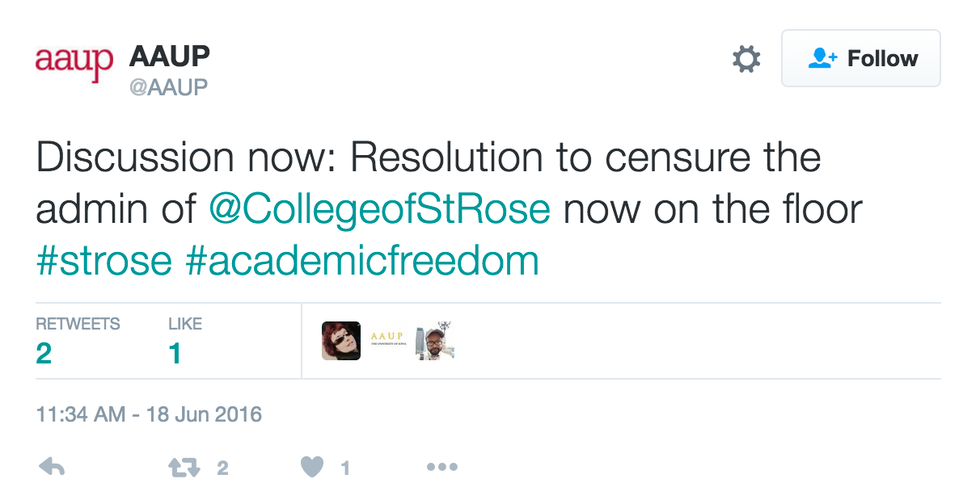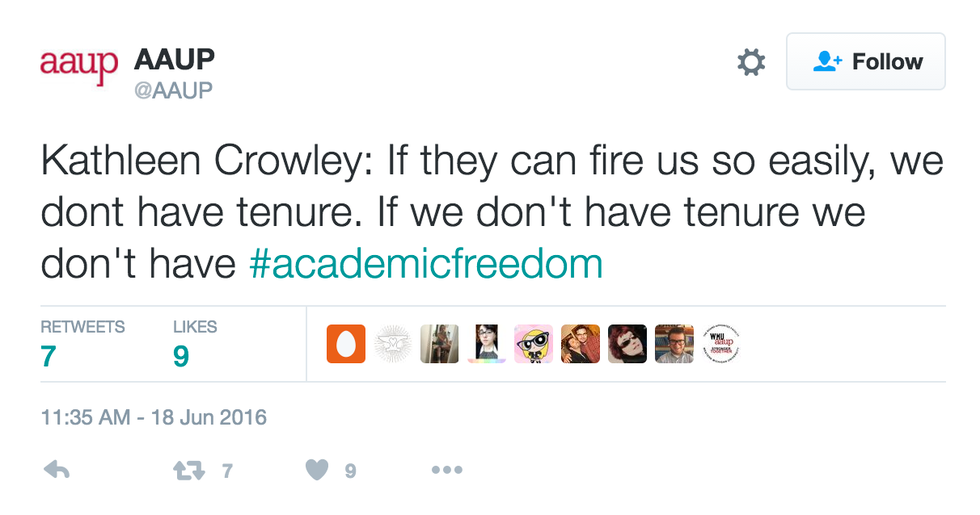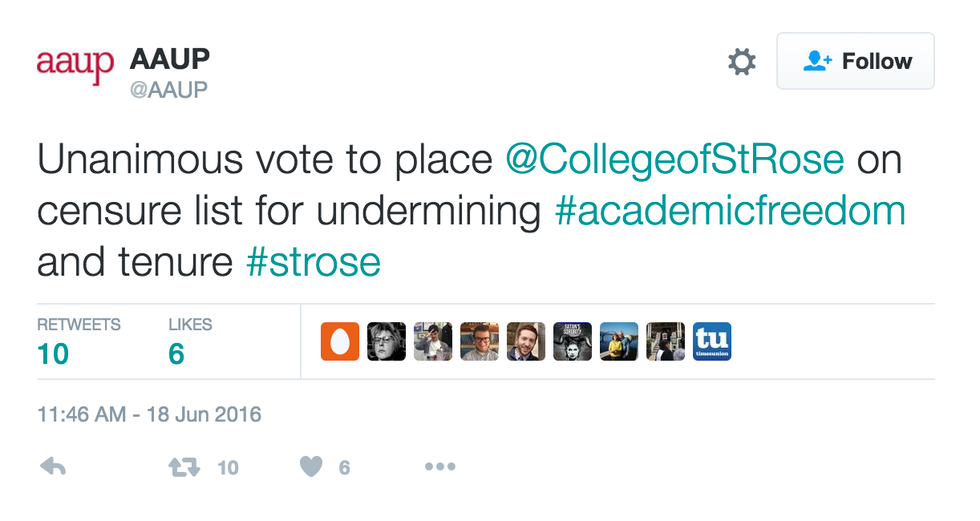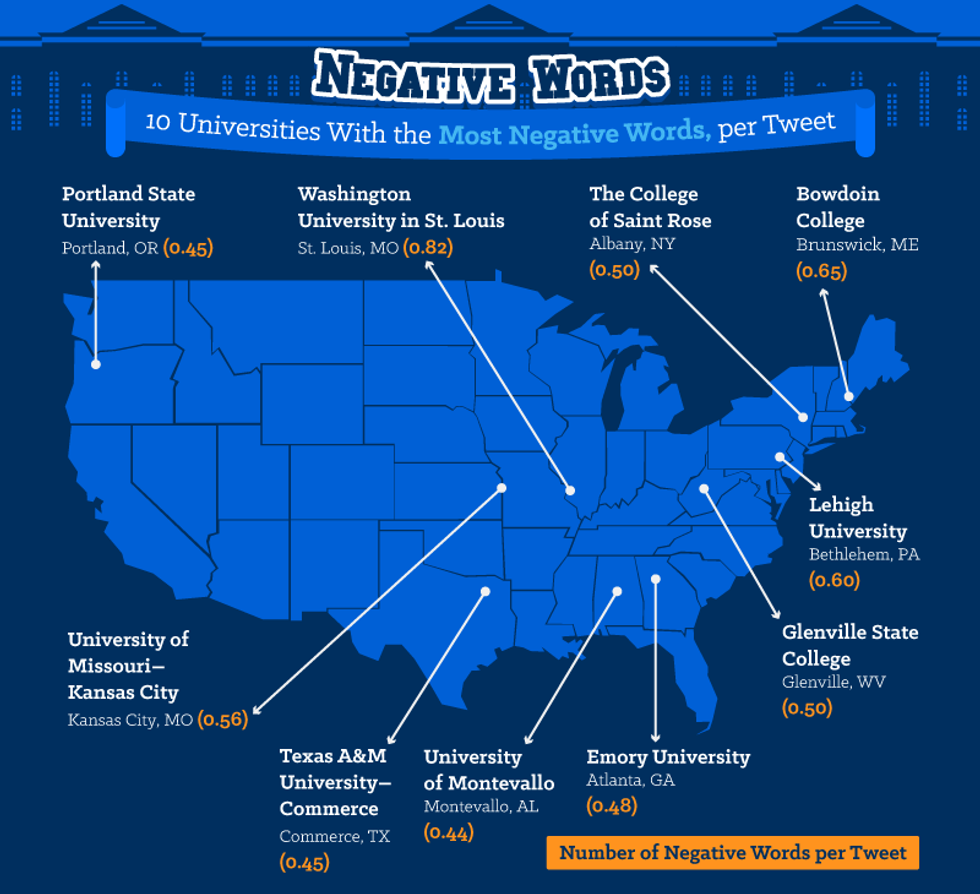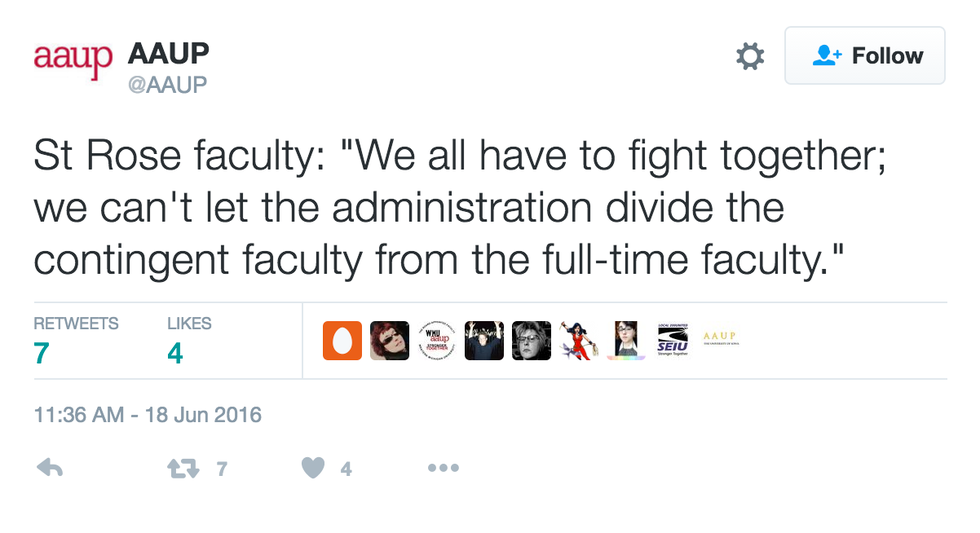On Saturday, June 18, the American Association of University Professors (AAUP) convened for their 102nd annual meeting at Washington, D.C.'s Mayflower Hotel. During this meeting, The College of Saint Rose (Albany, NY) was revisited after the AAUP released a report following an inquiry in December of 2015. The report, documenting violations of the College's own policies and contracts by upper level administrators, was released in May 2016.
What happened?
At the AAUP annual meeting, the report, as well as testimonies from members of the Saint Rose faculty, resulted in a unanimous vote to censure the College.
According to the Association's website, censure by the AAUP is inflicted on institutions of higher education when, "as evidenced by a past violation, they are not observing the generally recognized principles of academic freedom and tenure approved by this Association, the Association of American Colleges and Universities, and more than two hundred other professional and educational organizations which have endorsed the 1940 Statement of Principles on Academic Freedom and Tenure." More information about AAUP's censure process can be found here.
Who are the AAUP?
The Association's website states their mission as the following: "The mission of the American Association of University Professors (AAUP) is to advance academic freedom and shared governance; to define fundamental professional values and standards for higher education; to promote the economic security of faculty, academic professionals, graduate students, post‐doctoral fellows, and all those engaged in teaching and research in higher education; to help the higher education community organize to make our goals a reality; and to ensure higher education's contribution to the common good. Founded in 1915, the AAUP has helped to shape American higher education by developing the standards and procedures that maintain quality in education and academic freedom in this country's colleges and universities."
The AAUP is America's leading authority on issues related to shared governance, academic freedom, and tenure and the working conditions of academic professionals. Hundreds of colleges and universities around the country have affiliated chapters to maintain the rights of educators and researchers as workers.
What does censure mean for Saint Rose?
According to the AAUP, the decision to censure an institution is made with the purpose of "informing Association members, the profession at large, and the public that unsatisfactory conditions of academic freedom and tenure have been found to prevail at these institutions... Placing the name of an institution on this list does not mean that censure is visited either upon the whole of the institution or upon the faculty, but specifically upon its present administration. The term 'administration' includes the administrative officers and the governing board of the institution."
Placement on the censure list is effectively a caution to job-seeking professors and academics, prospective students interested in their tuition going toward ethical labor practices, and parents of current or potential students.
Professors may refuse their teaching services to the College based on its status as a censured institution due to concerns that they may be mistreated by its governing administration: "Members of the Association have often considered it to be their duty, in order to indicate their support of the principles violated, to refrain from accepting appointment to an institution so long as it remains on the censure list. Since circumstances differ widely from case to case, the Association does not assert that such an unqualified obligation exists for its members; it does urge that, before accepting appointments, they seek information on present conditions of academic freedom and tenure."
Locally, the controversial decisions made by the College's administration with the support of its Board of Trustees to lay off 23 full-time faculty members and eliminate 28 academic programs has sparked conflict and resulted in protests on campus and at events around Albany. While the College's President Carolyn Stefanco and chair of the Board of Trustees Judy Calogero assert that a minority of students will be affected by these changes, members of student/faculty alliances at the College say otherwise.
The AAUP's unanimous vote of censure suggests that the students and workers appalled by the drastic and sudden cuts to Saint Rose's faculty and academic offerings are not in the minority. To appear on the brief list of institutions branded so unfavorably by the Association speaks to the outstanding and rare nature of the violations leading to the College's censure. In fact, Saint Rose has gained notoriety for poor favorability on social media, landing on this map of colleges and universities with the most negative Twitter mentions.
While administrative officials continue to state that the AAUP has no power or influence over decisions at Saint Rose, their refusal to adhere to a familiar framework of tenure has led to the formation of FASTR (Faculty Association of Saint Rose) and a local chapter of AAUP on campus, organizing campus professionals to advocate for their rights and professional security. Full-time faculty members are currently following in the footsteps of Saint Rose adjunct professors to form a union of their own.
Meanwhile, Saint Rose students concerned with their lack of influence on where their tuition is spent have taken matters into their own hands. During the spring semester, a number of students organized themselves following the controversy, beginning the effort to form a student union on campus.
The censure, seemingly in solidarity with such campus groups, may be a turning point for the College, and placed the recent crises under a microscope for academic experts. The future of the College is unclear, but the involved groups may still work together to resolve the conflict.




